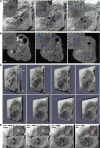Integrated molecular imaging reveals tissue heterogeneity driving host-pathogen interactions
- PMID: 29540616
- PMCID: PMC6005374
- DOI: 10.1126/scitranslmed.aan6361
Integrated molecular imaging reveals tissue heterogeneity driving host-pathogen interactions
Abstract
Diseases are characterized by distinct changes in tissue molecular distribution. Molecular analysis of intact tissues traditionally requires preexisting knowledge of, and reagents for, the targets of interest. Conversely, label-free discovery of disease-associated tissue analytes requires destructive processing for downstream identification platforms. Tissue-based analyses therefore sacrifice discovery to gain spatial distribution of known targets or sacrifice tissue architecture for discovery of unknown targets. To overcome these obstacles, we developed a multimodality imaging platform for discovery-based molecular histology. We apply this platform to a model of disseminated infection triggered by the pathogen Staphylococcus aureus, leading to the discovery of infection-associated alterations in the distribution and abundance of proteins and elements in tissue in mice. These data provide an unbiased, three-dimensional analysis of how disease affects the molecular architecture of complex tissues, enable culture-free diagnosis of infection through imaging-based detection of bacterial and host analytes, and reveal molecular heterogeneity at the host-pathogen interface.
Copyright © 2018 The Authors, some rights reserved; exclusive licensee American Association for the Advancement of Science. No claim to original U.S. Government Works.
Conflict of interest statement
Figures







References
Publication types
MeSH terms
Grants and funding
- R01 AI069233/AI/NIAID NIH HHS/United States
- R21 AI107233/AI/NIAID NIH HHS/United States
- R01 AI132560/AI/NIAID NIH HHS/United States
- P41 GM103391/GM/NIGMS NIH HHS/United States
- P30 DK058404/DK/NIDDK NIH HHS/United States
- S10 RR026742/RR/NCRR NIH HHS/United States
- T32 GM065086/GM/NIGMS NIH HHS/United States
- S10 OD021804/OD/NIH HHS/United States
- T32 GM008320/GM/NIGMS NIH HHS/United States
- R01 AI073843/AI/NIAID NIH HHS/United States
- R01 AI101171/AI/NIAID NIH HHS/United States
- S10 OD012359/OD/NIH HHS/United States
- K08 AI113107/AI/NIAID NIH HHS/United States
LinkOut - more resources
Full Text Sources
Other Literature Sources

